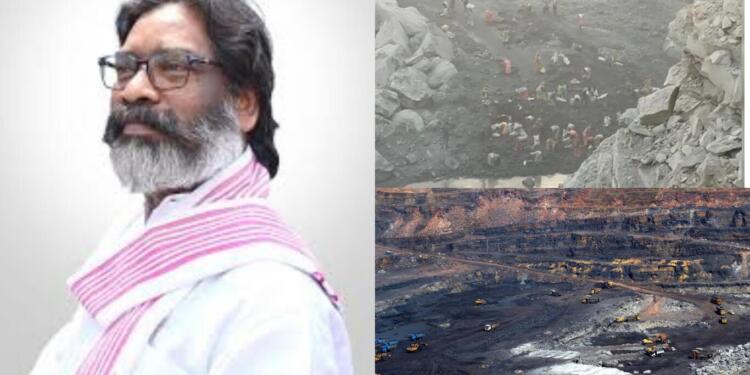Nine workers were killed in a tragic mine collapse during illegal coal mining operations in Dhanbad, Jharkhand, under the Baghmara police station limits. The accident occurred in Block 2, where debris from an unauthorized mine caved in, instantly burying the miners. According to eyewitnesses and a tweet from MLA Saryu Roy, the deaths occurred at Jamunia, and local mafia figures are now reportedly attempting to dispose of the bodies to suppress the incident. The Dhanbad police, reportedly alerted only after Roy’s social media post, were accused of initially trying to suppress the matter. Media access to the site has been restricted, and the deceased have not yet been officially identified. The incident triggered a wave of criticism against the Hemant Soren-led Jharkhand government.
A Repeat Tragedy: Government Apathy and Complicity?
This is not an isolated tragedy. Just days earlier, four workers died in a similar illegal mining accident. According to BJP spokesperson Pratul Shahdev, illegal mining has become institutionalized under the current regime, with repeated fatalities and no accountability. He has called for a CBI inquiry, labeling the incident an “institutional murder”. The question arises: Why has the state consistently failed to curb illegal mining despite its fatal consequences?
Dhanbad, often referred to as the coal capital of India, is also infamously synonymous with coal mafia operations that thrive on political complicity, weak enforcement, and bureaucratic apathy. The entire mining economy in regions like Jharia and Baghmara is under the shadow of illegal networks that control extraction, transportation, and even e-auctions through intimidation and bribery.
Decades of Mafia Rule and Collapsed Governance
Illegal coal mining in Dhanbad is not a new problem. The roots of this shadow industry go back to the nationalization of coal mines in the 1970s. While this move created PSU giants like Bharat Coking Coal Limited (BCCL), it also opened the door for local strongmen to dominate every aspect of mining. These mafia lords formed unions, manipulated tenders, and established parallel systems of governance.
बाघमारा,धनबाद के जमुनिया नामक स्थान पर अवैध खनन की चाल धँसने से आज रात 9 मज़दूरों की मौत हो गई है.अवैध खनन माफिया मृतकों का शव निपटाने में लगे हैं.इसकी सूचना मैंने #ssp #धनबाद को दे दी है.प्रत्यक्षदर्शी के अनुसार चुनचुन नामक खनन माफिया प्रभावशाली संरक्षण में अवैध खनन करा रहा था.
— Saryu Roy (@roysaryu) July 22, 2025
Today, the mafia exerts complete control over the mining process—from pit to port. Miners, often poor locals or migrants, work in unsafe, unregulated environments. Trucks are loaded only after paying a “goonda tax” of up to Rs 1,200 per ton to mafia bosses. Many of these operations are run with the knowledge—and sometimes support—of corrupt officials within PSUs and local administration.
Even the Directorate General of Mines Safety (DGMS) has acknowledged that this criminal culture is deeply entrenched and widely accepted in mineral-rich areas like Dhanbad.
The Human Cost: Death, Displacement, and Desperation
While the coal mafia flourishes, the cost is borne by vulnerable communities. Families displaced by official and unofficial mining receive neither adequate compensation nor jobs. Stripped of options, many turn to picking coal from abandoned mines, transporting it to black markets on modified bicycles or scooters. For them, illegal mining is not a choice—it’s survival.
However, this dangerous work comes at a fatal price. Mine collapses like the one that killed nine in Jamunia are common. Victims are rarely acknowledged as workers. Instead, they are branded as thieves or trespassers, and their families receive no compensation. In 2023, a similar collapse killed three workers. In 2022, activist and Dhanbad resident Bijay Kumar Jha filed a petition in the High Court stating that out of 32 million tons of coal produced by BCCL annually, 10 million tons are lost to theft.
Illegal operations also thrive on the ruins of discontinued mine sites. An April 2022 district magistrate meeting noted that unsecured abandoned mines serve as hubs for coal theft, revenue loss, and the funding of antisocial activities. Despite warnings, no meaningful action has been taken.
Lawlessness, Politicization, and Wasseypur Legacy
The city’s criminal ecosystem, as dramatized in the film Gangs of Wasseypur, is not just lore. Real-life figures like Prince Khan, nephew of convicted gangster Faheem Khan, continue to hold the city hostage through extortion and violence. Red notices have been issued against him, but his network in Dhanbad remains active. Threats, strikes, and FIRs against his gang are frequent, but arrests are rare. Local politicians are either silent or complicit.
On the legal front, courts have tried to intervene. But the state machinery often fails to act or colludes with the culprits. Activists have long argued that mining deaths should be recognized as workplace accidents.
Will the Hemant Soren Government Act Before More Die?
Despite the mounting death toll, the Hemant Soren-led Jharkhand government has failed to take decisive action. The problem is no longer about isolated incidents but an entrenched ecosystem of corruption, crime, and state failure. The tragedy in Jamunia that killed nine workers is a glaring reminder of the human cost of this negligence.
Unless the government enforces strict regulations, cracks down on mafia networks, and ensures compensation and rehabilitation for displaced families, the coalfields of Jharkhand will continue to be graveyards for its poor. The Soren administration must answer: How many more must die before illegal mining is seriously addressed?





















